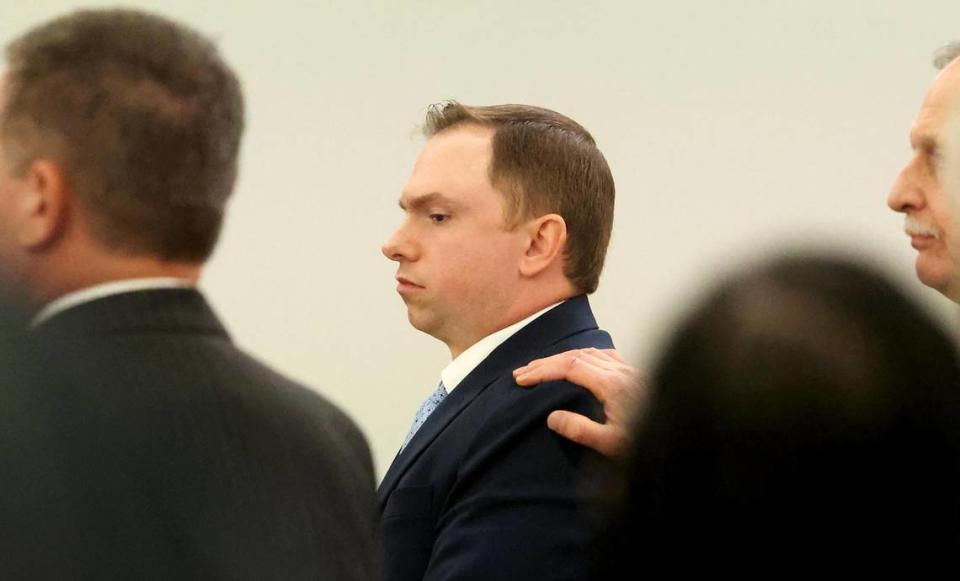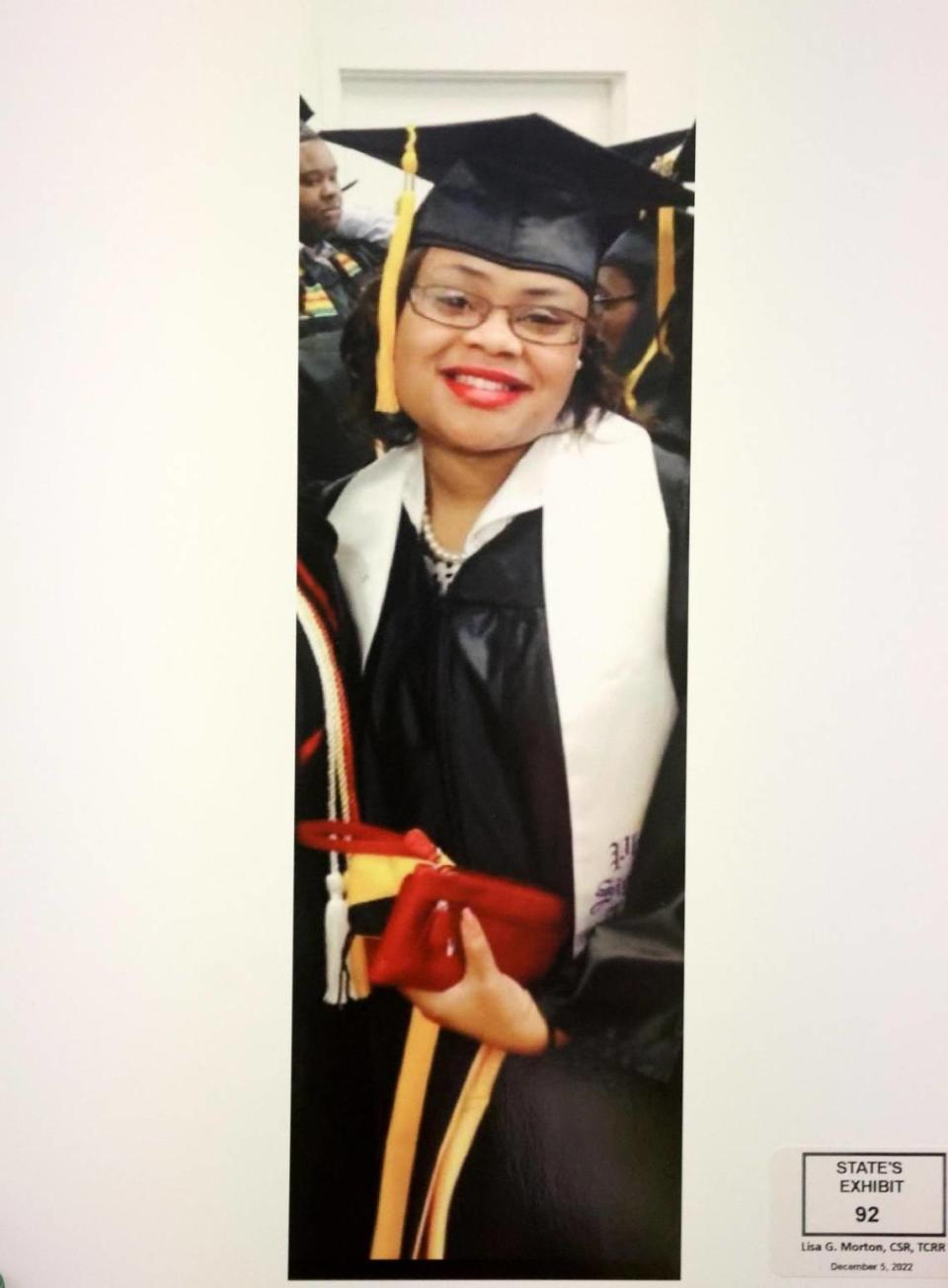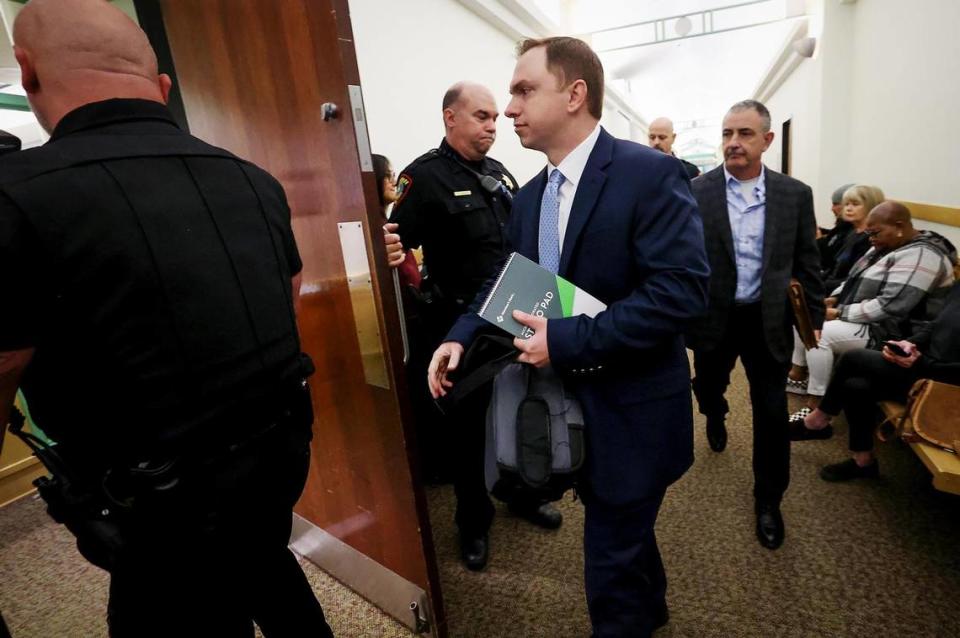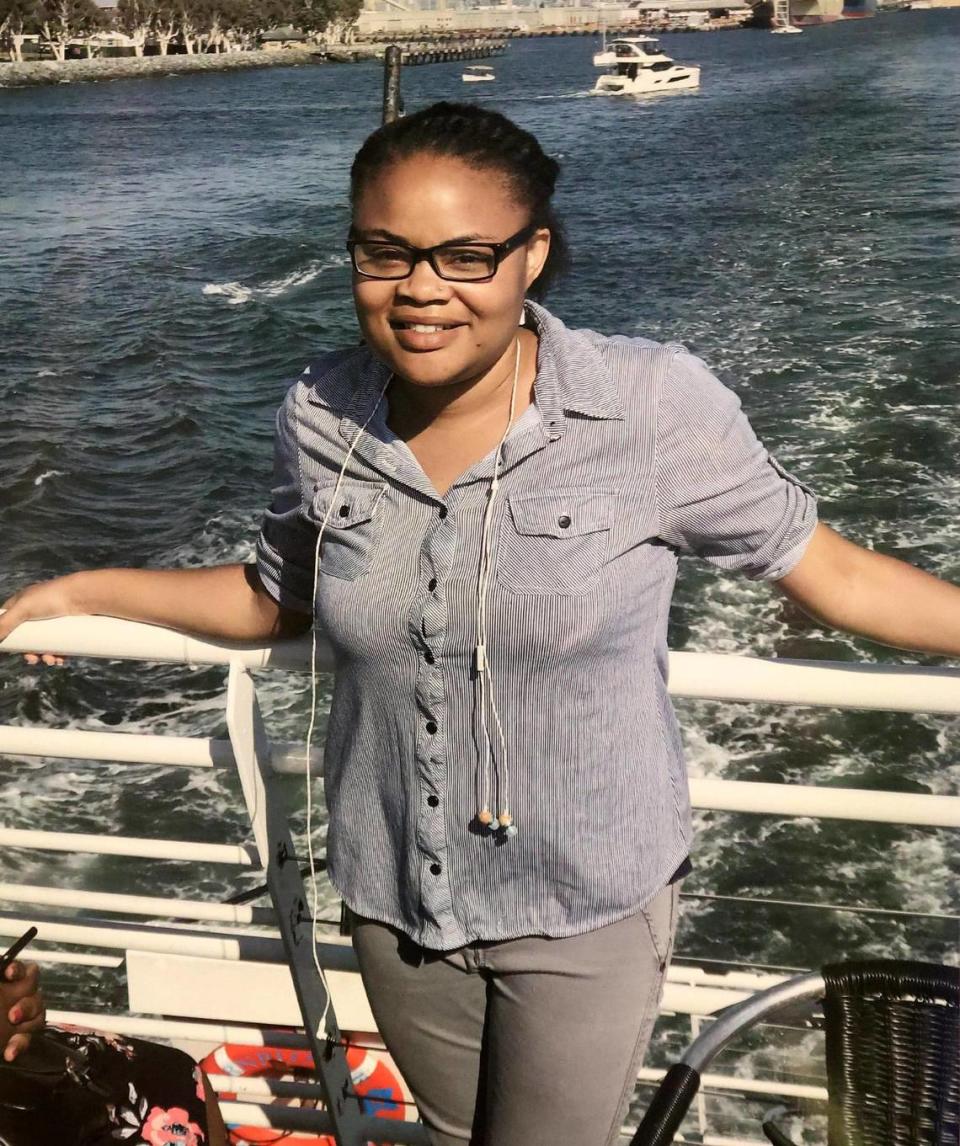In last pitch for guilt, prosecutors paint Aaron Dean as ‘gung-ho’ cop who broke rules
Prosecutors in Aaron Dean’s murder trial made their final arguments to jurors Wednesday by portraying him as a “hard-charging” Fort Worth police officer whose recklessness and violations of protocol resulted in him fatally shooting Atatiana Jefferson in her own home.
The defense called the October 2019 shooting tragic but necessary, emphasizing that Dean was clearly in uniform when he entered Jefferson’s back yard to investigate a possible burglary. He reacted reasonably to protect himself and his partner when he saw Jefferson point a gun at him from inside, Dean’s lawyer said.
The jury began its deliberations around 11:15 a.m. Wednesday in Tarrant County’s 396th District Court. The jurors had not reached a verdict as of 5 p.m., and Judge George Gallagher said he would allow them to continue deliberating as long as they wanted into the night. Visit star-telegram.com for the latest updates.
Wednesday’s closing arguments to the jury touched on all of the difficult themes that have been entangled throughout the case: Race, justice and trust in law enforcement to “serve and protect.” The dangers and pressures that officers regularly encounter. Inequities in how certain Fort Worth neighborhoods are policed. The violation of sacred space in one’s own home. The differing versions of what would constitute self-defense in that fraction of a second in Jefferson’s back yard.
Prosecutors tried to paint Dean as reckless at best, a “gung-ho” renegade who wanted to see action and cared little about the consequences of his actions.
They sought to sway the jury emotionally, concluding their case by asking the panel to think about what makes them feel safe in their homes, then hitting hard by using Dean’s own words when he confirmed that Jefferson had been armed — words that implied he was relieved to find that she had a gun after he had fatally wounded her.

Dean was indicted on a charge of murder, but the judge told the jurors they would be allowed to consider manslaughter, a lesser offense, as an option. If Dean is convicted of murder or manslaughter, the sentencing phase of the trial would begin, and the same jury would determine Dean’s punishment.
In the prosecution’s closing arguments, Assistant District Attorney Ashlea Deener displayed family photos of Jefferson and told the jury that this case is about protecting the right of people to feel safe in their homes.
“If you can’t feel safe in your own home, where can you feel safe?” Deener asked.
“The safety of our homes has been compromised by what he did,” she said of Dean. “He took her away — 28 years old.”

Dean and another officer, Carol Darch, responded to Jefferson’s home on East Allen Avenue about 2:30 a.m. on Oct. 12, 2019, after a concerned neighbor called about open doors. Jefferson and her 8-year-old nephew, Zion Carr, were playing video games in her room. Zion testified that they had opened the doors to let out smoke after burning hamburgers. Dean and Darch testified that they mistakenly thought a burglary might be in progress and opened the gate to search the back yard.
Deener described Dean as a power-hungry cop who rushed through the proper protocol he should have followed on the call so he could get into the action. She argued that Dean had preconceived ideas about Jefferson’s Hillside Morningside neighborhood being a dangerous area and that he didn’t serve and protect all citizens equally, like the many good Fort Worth police officers she knows.
“You can’t create the danger and then claim self-defense,” Deener said.
She affirmed that Jefferson was within her legal rights to use a handgun to protect herself and her nephew.
Defense attorney Bob Gill showed the jury a photo of Dean in uniform. He repeatedly called Jefferson’s death a tragedy, but added that “a tragedy doesn’t always equal a crime.”
He said Dean also had a fundamental right to defend himself and his partner.
“You recall during jury selection, we asked you, does an officer have to wait until he’s dead to exercise his right of self-defense? Of course not,” Gill said.
Gill said Jefferson had those rights, too, until the moment she “unlawfully” pointed her weapon at a police officer.
“We never have the right under the law to point a firearm at a uniformed police officer,” Gill said. “That conduct is a first-degree felony” under Texas law.

Prosecutors countered that Jefferson wasn’t pointing a gun at Dean when he fired at her.
It has not been confirmed that Jefferson knew Dean was a police officer. By Dean’s own admission, he never verbally announced himself. Zion told a forensic interviewer hours after the shooting that he could see the officer’s badge and gun outside the window, but on the witness stand in court last week said he didn’t see anyone outside.
Another key point is whether Dean saw a gun in Jefferson’s hand. Gill reminded the jury that a video analyst who testified for the defense on Monday said Dean’s body-camera video showed Jefferson’s hand extended with a dark object in it. The analyst could not confirm what the object was.
“Nothing that we do here this week is going to bring Ms. Jefferson back, unfortunately,” Gill said. “Nothing can change that. But by the same token, the tragedy should not be compounded by finding guilty a man who was relying on his rights as a police officer.”
Gill said it was the state’s burden to prove beyond a reasonable doubt that Dean did not act in self-defense. He reminded jurors of their instructions not to be swayed by sympathy or public opinion.
Dean “took the witness stand because he wanted you to hear everything,” Gill said. “And he told you what happened.”
The jurors should know that “what Aaron said is correct and truthful because it’s the same thing that was said by the other two eyewitnesses as to what happened there that day,” Gill said. Those other two witnesses were Zion, and Dean’s body-camera video, he said.
Gill replayed for the jury video from Zion’s conversation with a forensic interviewer trained to talk to children, filmed hours after the shooting. In the interview, Zion said his aunt heard noises in their back yard, grabbed her handgun from her purse and pointed it at the window. Zion said that the male officer shouted at his aunt to put her hands up and that he shot her when “she didn’t do that.”
When Zion answered attorneys’ questions in court last week, he said his aunt held the gun down by her side and didn’t point it at the window. Zion’s “testimony took a real different turn from the truth,” Gill said, adding that he believes Zion succumbed to outside pressure to change his testimony.

Gill emphasized that police work is inherently dangerous and officers have to make split-second decisions. He said that prosecutors and their witnesses did “a lot of Monday morning quarterbacking about how Aaron handled that call.” He said Dean followed the police department’s general orders for an open structure call by trying to make a complete inspection of the house from all sides before doing anything else, like calling for backup.
“It’s simple, you go out there and do the best you can,” Gill said.
Gill said that the neighbor who made the call, James Smith, didn’t go knock on the door himself because he didn’t have a weapon. It was dark on the street, and James Smith said he had never seen the front door open before.
Prosecutors have emphasized that Dean did not perform CPR and waited a full minute after entering Jefferson’s bedroom before he pressed an afghan to her chest to try to stop the bleeding.
Gill referred to the medical examiner’s testimony, saying that the wound would have killed Jefferson no matter what Dean did. “No one was going to be able to save her in that house,” Gill said. “That’s a tragic fact, but it’s a fact.”
Dean reacted “reasonably ... tragically ... but correctly under the law,” Gill concluded.
‘She never had a chance’
Prosecutor Dale Smith told the jurors during the final arguments they heard that Jefferson had no idea there were police officers in her yard when she grabbed her gun to protect herself and Zion.
Only half a second passed between Dean shouting “put your hands up” and firing the fatal shot, he said.
“She never had a chance,” Smith said.
Smith emphasized again that Dean never told his partner he had seen a gun or that there could be danger in the house from a gun. According to Smith, that indicates he never saw one through Jefferson’s window.
Dean continued to stand in front of the window after firing the single shot and didn’t warn Darch of any danger “because he wasn’t sure what was on the other side of that window,” Smith said.

When the officers entered the house, Dean didn’t try to help Jefferson “as she’s dying in front of him,” but instead looked between her feet and said, “Looks like we have a weapon here,” Smith said.
Dean sighed in relief, he said.
“That’s not the declaration of a person who was sure of what they saw,” Smith said. “Because he didn’t know when he pulled that trigger.”
Smith frequently pointed his finger at Dean as he attacked the officer’s actions. Dean appeared to be taking notes and did not look up at the prosecutor.
Smith also brought up that the defense referred in opening statements to Dean seeing the green laser from Jefferson’s gun pointed at him. Smith noted that during testimony, no witnesses said anything about Dean seeing the laser when he was outside Jefferson’s window.
Jefferson would still be alive if Dean had knocked on the door or announced his presence, Smith said.
The prosecutor said Dean didn’t care about his partner’s safety or the safety of anyone in the house. Jefferson was the one who had no choices in the situation, he said. “Her only crime was love and protection of her nephew,” Smith said.
‘This is murder’
The jury heard testimony from a medical examiner that indicated that Jefferson was leaning forward when she was shot. Her hands showed no signs of being hit by shattered glass from the window, which means she couldn’t have been pointing a gun at Dean when she was shot, prosecutors said. They once again showed autopsy images to the jurors Wednesday.
“An accident — that’s spilling your milk at breakfast. This is murder,” Smith said.
Dean “was hard charging. He was gung ho. He finally got some action and he pulled his weapon and because of that Atatiana will never breathe again,” the prosecutor concluded.
During the arguments, the jurors seemed attentive, looking at the attorneys speaking. One of them glanced at Jefferson’s family as the panel stood to leave the courtroom for deliberations.
Members of Jefferson’s and Dean’s families were sitting on opposite sides of the courtroom and were quiet throughout the arguments.

If the jury convicts Dean of murder, meaning he intentionally or knowingly killed Jefferson and did not reasonably act in self-defense or defense of another person, he could spend five years to life in prison.
Manslaughter is a crime in which the defendant caused a person’s death by acting recklessly, and it carries a prison sentence between two and 20 years. Self-defense also is a legal justification for manslaughter.
To find that Dean’s actions were justified by self-defense or defense of another person, the jurors would have to believe that it was immediately necessary for him to shoot Jefferson to protect himself or someone else from deadly force.
The jurors will be sequestered until they reach a verdict.
Extra security, including deputies and Texas state troopers, was at the courthouse Wednesday.
In the three years since the shooting, Jefferson’s family and many in the community have called for justice and criticized delays in the case of a white officer who killed a Black woman.
None of the jurors in the case are Black, though several are people of color. In the selection process, the jury pool is numbered and the court accepts the first 12, plus two alternates, who attorneys believe can decide the case fairly.
Jefferson had moved in to her mother’s home to care for her while she was ill. Her mother, Yolanda Carr, was in the hospital the night of the shooting and died a few months later.
Jefferson was saving money to attend medical school and helping raise Zion while his mother also was in the hospital, one of her sisters, Ashley Carr, testified last week.
Dean, 38, resigned from the police department two days after the shooting and was arrested later that night.
Senior managing editor Matt Leclercq and staff writer Jenny Rudolph contributed to this report.

